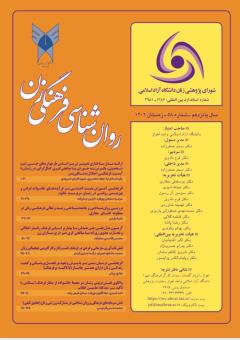آزمون مدل علی حس همدلی با بیمار بر اساس فرهنگ رفتار اخلاقی و تجارب معنوی روزانه با میانجی گری صبر در پرستاران زن
محورهای موضوعی : روان شناسی
1 - کارشناسی ارشد، گروه روان شناسی بالینی، مشاور مرکز درمانگاه خانواده، نیروی زمینی ارتش، سنندج، ایران.
کلید واژه: فرهنگ رفتار اخلاقی, صبر, تجارب معنوی روزانه, حس همدلی با بیمار,
چکیده مقاله :
هدف پژوهش حاضر آزمون مدل علی حس همدلی با بیمار بر اساس فرهنگ رفتار اخلاقی و تجارب معنوی روزانه با میانجی گری صبر در پرستاران زن شهر سنندج بود. جامعه آماری شامل کلیه پرستاران زن شهر سنندج بود که در سال 1400 در بیمارستان های دولتی مشغول به فعالیت بودند. نمونه پژوهش 200 نفر بود که به روش نمونه گیری دردسترس انتخاب شدند. روش پژوهش همبستگی از نوع تحلیل مسیر بود. ابزار اندازه گیری شامل مقیاس حس همدلی با بیمار جفرسون (1995)، پرسشنامه فرهنگ رفتار اخلاقی تروینو و بوترفیلد (1998)، مقیاس تجارب معنوی روزانه محمدعلی پور و همکاران (2016) و مقیاس صبر خرمائی و همکاران (2015) بود.تجزیه و تحلیل داده ها با استفاده از تحلیل مسیر و نرم افزار SPSS22 و Amos22 صورت گرفت. نتایج تحلیل نشان داد که مدل پیشنهادی از نیکویی برازش مطلوبی برخوردار بود و بین تجارب معنوی روزانه، فرهنگ رفتار اخلاقی با حس همدلی با بیمار در پرستاران زن رابطه مستقیم وجود دارد (05/0>p). هم چنین بین تجارب معنوی روزانه و فرهنگ رفتار اخلاقی از طریق صبر با حس همدلی با بیمار در پرستاران زن رابطه غیرمستقیم وجود دارد. بنابراین می توان گزارش کرد که پرستاران زن با بروز حس همدلی، فرهنگ رفتار اخلاقی، تجارب معنوی روزانه و صبوری با بیماران نقش مهمی را در روند درمانی ایفا میکنند.
The aim of the current research was to exmine the causal model of empathy with the patient based on the culture of ethic behavior and daily spiritual experiences with the mediation of patience in female nurses of Sanandaj city. In this study, the population included all the female nurses of Sanandaj who were working in public hospitals in 2021. The sample embraced 200 female nurses from the mentioned group whom were selected by convinence sampling method. The current research was a correlational study and path analysis type. To collect data, the Jefferson Patient Empathy Scale (1995), Trevino and Butterfield's Ethical Behavior Culture Questionnaire (1998), Mohammad Alipour et al.'s Daily Spiritual Experiences Scale (2016) and Khormai et al. (2015) Patience Scale were implemented. The data were analyzed through applying path analysis, by using SPSS vesion 22 and Amos 23. The results of the analysis showed that the proposed moded had an optimum goodness of fit and there was a significant direct path between daily spiritual experiences, the culture of ethical behavior and empathy with the patient in female nurses (p<0.05). Also, daily spiritual experiences and the culture of ethical behavior through patience had an indirect significant relationship with the sense of empathy with the patient in nurses (p<0.05). It could be concluded that the the female nurses based on the culture of ethic behavior and daily spiritual experiences with the mediation of patience should accomplosish empthy with patiants and play significant role to promote patients cure.

